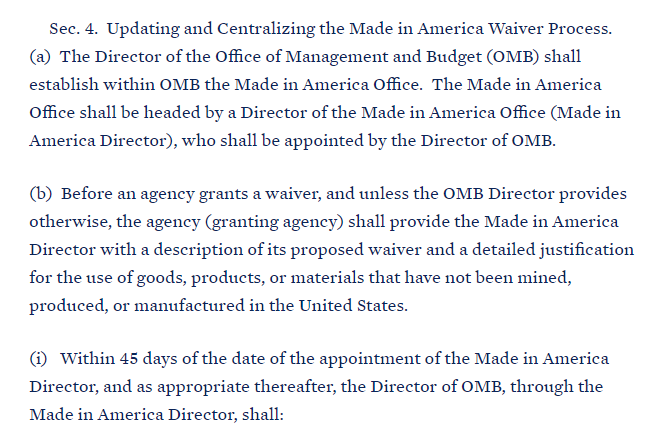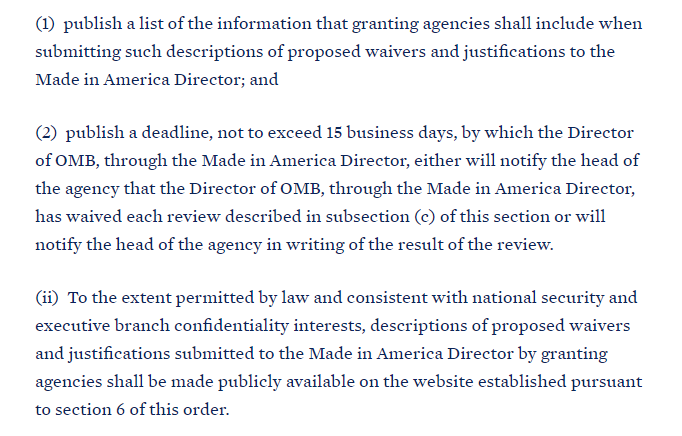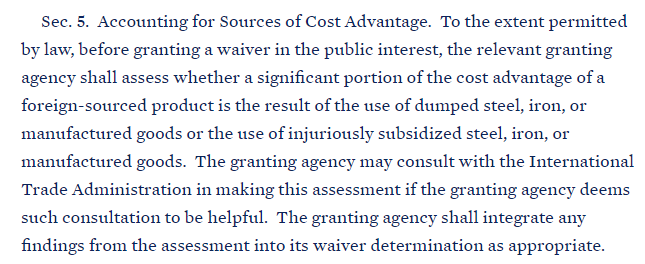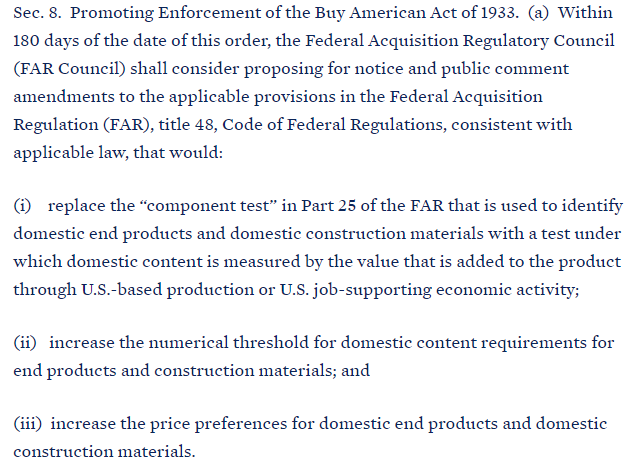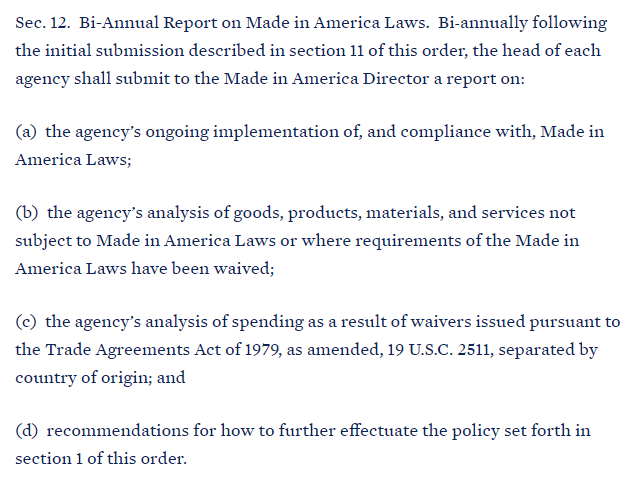With this new Executive Order on Buy American, the Biden-Harris Administration will fulfil a core campaign promise. A few thoughts… https://www.whitehouse.gov/briefing-room/statements-releases/2021/01/25/president-biden-to-sign-executive-order-strengthening-buy-american-provisions-ensuring-future-of-america-is-made-in-america-by-all-of-americas-workers/
To take the first order question first: why would the US want to give preference to domestic production? There are both normative and policy reasons.
On the normative front, it signals that there is something special about the money that we collectively put into the common coffer. That collective fund goes back to the collective.
It is different, then, from the money that circulates in the private economy, where we have decided as a general rule to allow private citizens and corporations to spend their own money on foreign products if they wish.
There are also policy reasons. When the government sends out checks to the private economy, private citizens will use a good share of that on foreign-made products – leading some of the benefit of those checks to leak outside of the US economy. https://www.marketwatch.com/story/americans-spent-their-stimulus-checks-on-discretionary-goods-such-as-bikes-video-games-and-clothes-target-and-walmart-ceos-say-2020-05-20
Yet we do not, as a general rule, prohibit those transactions, even though it limits the Keynesian multiplier benefit of the spending. (Though, hard times often lead to import collapses, making the multiplier benefit stronger.) https://www.tandfonline.com/doi/abs/10.1080/01603477.2016.1127121
Public procurement is different. Government has the capacity to decide from whence it buys, and it engages in no coercion of private citizens when it favors domestic production.
There’s an additional reason: domestic procurement preferences allow trade deficit / high currency value countries like the US a convenient way to counteract drags on US manufacturing.
This was one of the major takeaways of @michaelxpettis and @M_C_Klein’s latest book. https://www.amazon.com/Trade-Wars-Are-Class-International/dp/0300244177/
Crucially, procurement preferences are a way to boost manufacturing without raising tariffs.
(This is a point that gets missed by much of the economics profession, which tends to consider each tool in isolation with its own on-off switch and deviating from a market ideal, rather than as potential alternatives to one another in a world where there is no pure free market.)
Then, there are reasons that are a mix of normative and practical: domestic preferences create feedback loops that mobilize identifiable constituencies to support your political agenda, as Biden DOL'er @awh wrote about last year @rooseveltinst. https://rooseveltinstitute.org/publications/how-policymakers-can-craft-measures-that-endure-and-build-political-power/
A Black owned business that gets a Build Back Better contract is more likely to help get out the vote in elections to come. Ditto for the White boat salesman. It’s visible, it’s in communities, it builds trust in government.
Now, for the EO itself. Data from the federal government indicates that most agencies do a pretty good job buying products that meet the statutory definition of a domestic product. By some counts, it’s over 90 percent of federal purchasing.
https://beta.sam.gov/
https://beta.sam.gov/
The big gap is with the definition of domestic content itself. Until last week, only 50 percent of the value of the final product needed to be made in America in order to qualify.
(I say “until last week” because the Trump administration changed this to 55 percent on their last full day in office.) https://www.federalregister.gov/documents/2021/01/19/2021-00710/federal-acquisition-regulation-maximizing-use-of-american-made-goods-products-and-materials
The new EO will build on that. This is important. To use an example, say 10 percent of the components of an iPhone are made in the US, but China (where many are assembled) only makes $8 per phone.
The cost of all the markups that Apple makes could well exceed 50 percent of the total value of the end product. (There are a number of legal and technical reasons why this is not a good example, but it roughly illustrates the point.) https://www.vox.com/technology/2018/9/13/17851052/apple-iphone-price-china-trump-us-trade
So, while various Buy American waivers get a lot of the airplay, a lot of the reshoring action could come from the change in domestic content definition.
This is what industrial policy scholars call backward linkages, i.e. mobilizing the firms that sell inputs to products that other firms sell to the government. For more on industrial policy, see here https://rooseveltinstitute.org/publications/industrial-policy-and-planning/
The other big thing with the EO is that it will institutionalize human capacity around Buy American by creating a new Director of Made-in-America at OMB, centralizing disclosure of waiver applications, connecting to Manufacturing Extension Partnerships, etc.
While this is ostensibly what Peter Navarro did for some of his time in the White House, he also freelanced on things far outside that remit. Getting a serious person in the right office will make a huge difference. https://www.forbes.com/sites/joewalsh/2020/12/17/white-house-advisor-peter-navarro-releases-dubious-voter-fraud-report/?sh=6c7cfeab1205
Finally, while not part of today's EO, the Biden-Harris campaign's Made in America plan had an international and diplomatic dimension as well, making the point that all countries should get to spend tax dollars at home.
https://joebiden.com/made-in-america/
https://joebiden.com/made-in-america/
The President mentioned that point in the press conference just now. This brings the thread full circle to the top of the thread: tax dollars are special dollars, and societies should want them recirculating domestically for normative, policy, and political reasons. END.
Here's the text of the EO. It gives more detail on the process procurement officers are going to have to go through to grant a waiver.
https://www.whitehouse.gov/briefing-room/presidential-actions/2021/01/25/executive-order-on-ensuring-the-future-is-made-in-all-of-america-by-all-of-americas-workers/
https://www.whitehouse.gov/briefing-room/presidential-actions/2021/01/25/executive-order-on-ensuring-the-future-is-made-in-all-of-america-by-all-of-americas-workers/
Pre-2021, OMB reviewed agency action to make sure it wasn't too onerous on businesses. Now, with a modernized mandate and staff that value equity and sustainability, it will help agencies pursue those goals. https://twitter.com/toddntucker/status/1352375555304415232
Ooh, another huge thing I'm just noticing. Agencies will work with ITA to consider whether the cost advantage of a foreign product comes from foreign subsidies. Especially in the green economy, where subsidies abound, this will be a big deal.
Key will be what comes out of this process: how does the definition of domestic content get deployed to promote reshoring and good jobs.
This is also a big deal: current procurement rules allow Buy American waivers if a product is "commercially available" - meaning if you can go to Home Depot and buy it. That really limits the reshoring potential.
While some raise concerns that Buy American will raise costs to the taxpayer, this part of the EO has the chance to dramatically lower them (while tackling concentration), as this @econliberties report by procurement expert Richard Loeb shows https://www.economicliberties.us/press-release/economic-liberties-outlines-reforms-to-restore-competition-fair-pricing-and-transparency-to-government-contracting/
And frankly, the parts of the EO that just generate a paper trail are among the most valuable. As a researcher adjacent to this space for 20 years, getting reliable procurement data is tough.
GAO has dinged the executive branch for years on this.
https://www.gao.gov/products/GAO-19-17#:~:text=GAO%20was%20asked%20to%20review,guidance%20to%20implement%20the%20Act.
https://www.gao.gov/products/GAO-19-17#:~:text=GAO%20was%20asked%20to%20review,guidance%20to%20implement%20the%20Act.
For those that prefer this as a blog post, here you go: Modernizing Buy American Rules. https://toddntucker.medium.com/modernizing-buy-american-rules-5595c9eb3b5c

 Read on Twitter
Read on Twitter
